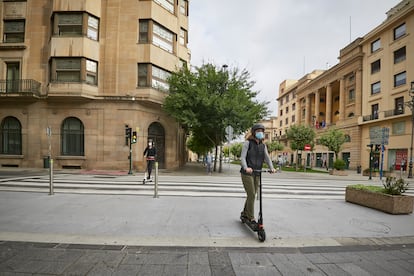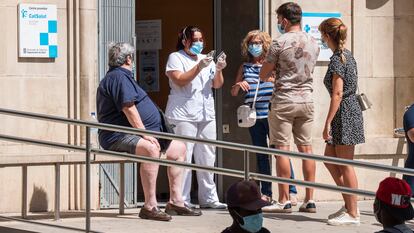Spain reports 730 new coronavirus cases in 24 hours
New lockdown rules have been placed on a neighborhood in Pamplona after more than 100 infections were detected in the area


The Spanish Health Ministry reported a significant rise in the number of new coronavirus cases in its daily report on Wednesday. According to the latest figures, 730 new infections were reported in 24 hours. This represents an increase of around 200 on Tuesday’s figure of 529. It is the highest number of daily infections recorded in Spain since May 8. But it is difficult to confirm whether this is an accurate assessment, given that health authorities did not provide any figures over the weekend or explain why hundreds of cases were added to the total a few days ago.
Regional authorities, which report all figures to the Health Ministry, also registered two new coronavirus deaths.
The worst figures were recorded in the Spanish regions of Aragón and Navarre, which reported 309 and 132 daily cases respectively. Navarre overtook Catalonia on Tuesday, and for the second day in a row, was the region with the second-highest number of new infections after Aragón.
A total of 224 coronavirus outbreaks are active in Spain, with 2,622 related cases
On Wednesday, the Navarre regional government moved the Pamplona neighborhood of Menillorri back to Phase 2 of the coronavirus deescalation plan, after 122 cases were detected in the area. Although the four-stage plan came to an end with the lifting of the state of alarm on June 21, the restrictions defined in each stage continue to serve as a reference to regulate restrictions. Under Phase 2, capacity in stores, restaurants and bars is reduced; opening hours for entertainment venues, gambling rooms and shows are cut back; and social gatherings of more than 10 people are not allowed, unless they are members of the same household.
The outbreak in Navarre is related to an area of nightlife venues, with 93% of the cases between the ages of 17 and 28. Outbreaks at parties and nightclubs have recently become a new source of concern for Spanish health authorities. “These days we are seeing an increase [in cases] due to nightlife activities, parties and social gatherings. They are situations that are beginning to especially worry us because they are more difficult to control,” said María José Sierra, from the Health Ministry’s Coordination Center for Health Alerts, on Monday.
The Madrid region reported the third-highest number of new coronavirus cases on Wednesday, with 70 infections in 24 hours, followed by Catalonia, with 58. Health Minister Salvador Illa informed on Wednesday that 224 coronavirus outbreaks are active in Spain, up from 201 on Monday. These outbreaks are linked to 2,622 cases. The total number of infections stands at 267,551 and the death toll at 28,426.
Spanish health authorities also reported a rise in one of the most useful indicators for understanding the trend of the epidemic: the number of cases diagnosed with symptoms beginning in the last seven days. This figure rose from 1,481 on Tuesday to 1,631 on Wednesday, according to the latest Health Ministry report.
There was, however, no significant change in the number of coronavirus hospital admissions. On Wednesday, the Health Ministry reported 288 hospitalizations and 11 intensive care admissions in the last seven days. On Tuesday, the number was 268 and 13, respectively. Health official José Sierra said on Monday that, with the exception of the Catalan province of Lleida, which has recorded a sharp rise in cases, “there is low stress on hospitals.”
Primary healthcare centers under pressure

With coronavirus patients becoming much younger and presenting less serious symptoms, the fight against the pandemic has shifted away from hospitals to Spain’s primary healthcare centers. But these centers are working with a skeleton staff, as many health workers have been forced to take vacation in July and August to avoid a collapse in the fall, when any seasonal virus could be a suspected Covid-19 case.
The situation has placed family doctors under even greater pressure as they face both a larger workload and the additional task of helping to track down coronavirus contacts. “In areas where there are a lot of outbreaks and not enough tracers – in Spain there is less than half the number considered necessary – primary health care centers are the ones that do this job as well as attending to all non-Covid-19 diseases, which could overwhelm them,” warned Salvador Tranche, the president of the Spanish Association of Family and Community Medicine (Semfyc).
Spain’s primary healthcare system has suffered systematic cuts as a result of the 2008 financial crisis. Funding was cut 2.1% in 2010, 4.2% in 2011 and 7.4% in 2012. The budget for primary healthcare did not begin to increase until 2015, but it has still not gone back to pre-crisis investment levels.
Whereabouts of 11 coronavirus cases unknown
The whereabouts of 11 coronavirus cases detected in an outbreak of 23 infections in Albacete in the Spanish region of Castilla-La Mancha remain unknown. The situation was confirmed to EL PAÍS by sources from the government delegation in Albacete and the regional health department.
The individuals are seasonal workers who, before being isolated in a sports center, were living in overcrowded and unsanitary conditions in an abandoned cereal factory and two centers on a highway on the outskirts of the city. When 23 of them tested positive for coronavirus, the other 400 workers in the makeshift settlement remained quarantined.
On Sunday, the group broke the confinement rules to join 100 colleagues, who had tested negative for Covid-19, to protest against the precarious situation. According to sources from the government delegations, officers from the local and national police, as well as the Civil Guard, have been deployed to address the situation.
With reporting by Pablo Linde, Elena G. Sevillano and Juan Carlos Espinosa.
English version by Melissa Kitson.
Tu suscripción se está usando en otro dispositivo
¿Quieres añadir otro usuario a tu suscripción?
Si continúas leyendo en este dispositivo, no se podrá leer en el otro.
FlechaTu suscripción se está usando en otro dispositivo y solo puedes acceder a EL PAÍS desde un dispositivo a la vez.
Si quieres compartir tu cuenta, cambia tu suscripción a la modalidad Premium, así podrás añadir otro usuario. Cada uno accederá con su propia cuenta de email, lo que os permitirá personalizar vuestra experiencia en EL PAÍS.
¿Tienes una suscripción de empresa? Accede aquí para contratar más cuentas.
En el caso de no saber quién está usando tu cuenta, te recomendamos cambiar tu contraseña aquí.
Si decides continuar compartiendo tu cuenta, este mensaje se mostrará en tu dispositivo y en el de la otra persona que está usando tu cuenta de forma indefinida, afectando a tu experiencia de lectura. Puedes consultar aquí los términos y condiciones de la suscripción digital.








































